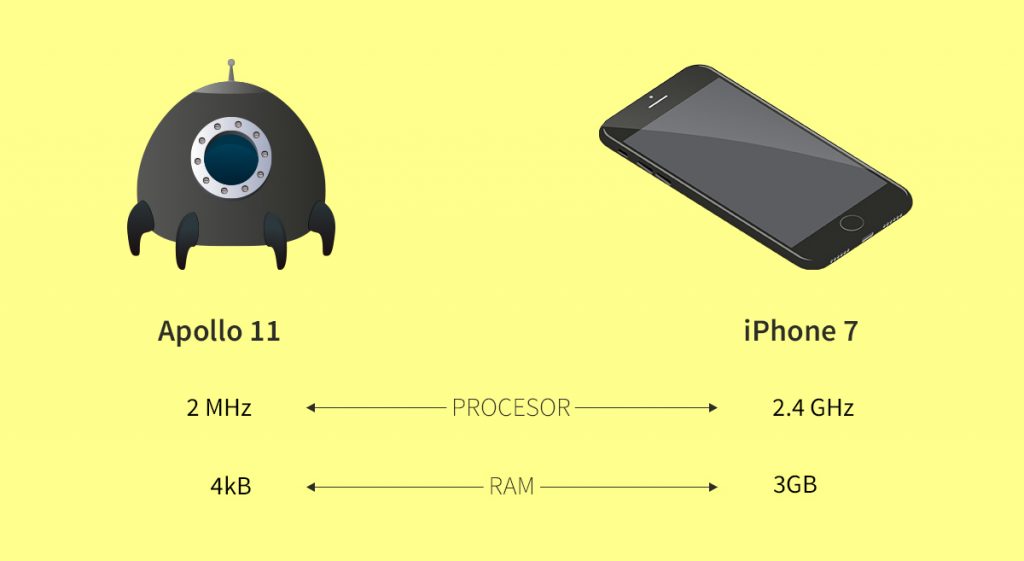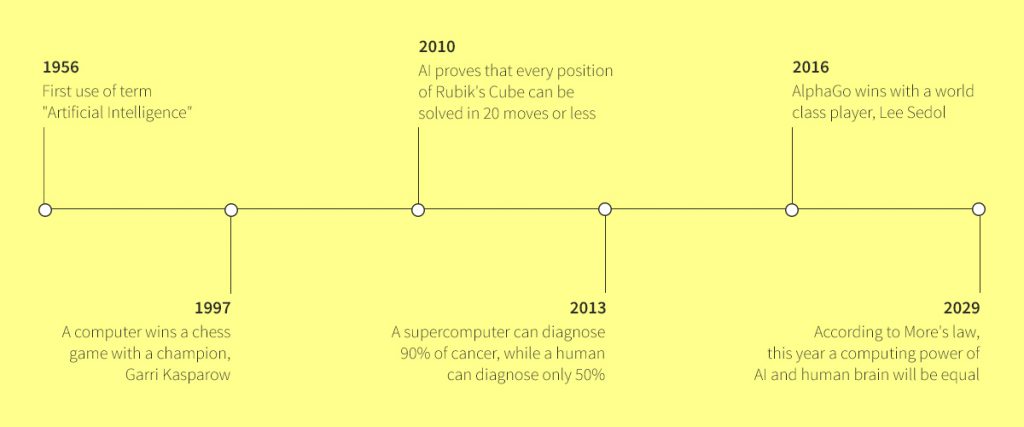Can a smartphone be used to land on the moon? – a short history of artificial intelligence
Table of contents
- How has the technology changed over the last decades?
- The development of artificial intelligence
- What is Artificial Intelligence?
- Artificial Intelligence that teaches itself
- What could the machines do for us?
- Artificial Intelligence in an online store
- What will the future of artificial intelligence look like?
- Sign up for
Do you want to increase sales and build even better relationships with your customers?
Artificial intelligence is not fiction. It is already our reality and has been for a very long time. Its origins date back to the 1950s. How has it changed since then? Are computers able to teach themselves? What does a smartphone have to do with the landing on the moon, and could machines be smarter […]
Artificial intelligence is not fiction. It is already our reality and has been for a very long time. Its origins date back to the 1950s. How has it changed since then? Are computers able to teach themselves? What does a smartphone have to do with the landing on the moon, and could machines be smarter than humans?
How has the technology changed over the last decades?
I remember how even recently while watching science fiction movies I looked in disbelief at the technologies presented in such films. It seemed improbable that our lives could look like in the movies. But now such scenarios are closer to reality than we think. The technology industry is currently one of the fastest growing fields.
In order to notice this, we just have to look at the changes that occurred in recent years. I think we all remember the NOKIA 3310 mobile phone model, which still enjoys a cult status today, and which was only used to make calls and send text messages (and of course to play the snake game). Today’s mobile phones have features that the computers of that time didn’t have. Although we never think about this, each of us now carries in our pocket a small device with a computing power thousands of times higher than the computer that was on board of the Apollo 11 space ship, which landed on the moon in 1969. Is there a better example showing how far technology advanced over the years?
Image 1: A comparison of Apollo 11 computer and iPone 7

The development of artificial intelligence
It is believed that the exact date of creation of artificial intelligence was the year 1956 when this name was used for the first time at the Dartmouth Conference. In that year for the first time in history, a computer program won a chess match with a beginner chess player. While this was a simplified game played on 6 x 6 board, let us remind, that we are talking about the 1950s. Some 41 years later a computer won a 6 round game of chess with multiple chess world champion Garry Kasparov. Computers are currently able to achieve results in many areas, which are impossible to obtain for humans.
What is Artificial Intelligence?
Artificial intelligence is nothing but a computer program which is smart enough to perform tasks that would usually require human analytical capabilities. The principle of its operation is based on algorithms that tell it what actions should be performed depending on the circumstances. It is designed to think like a human being, but only to a certain limited extent.
Image 2: Some of the groundbreaking events in AI history.

Artificial Intelligence that teaches itself
One of the revolutionary moments in the history of Artificial Intelligence was the emergence of machine learning. Officially the beginning of machine learning occurred in the 1980s, however even in the 1960s there were practical examples of it being used. Machine learning is based on creating rules basing on experience. The computing power available nowadays allows us to create neural networks that can learn to discern objects on photographs. Today machine learning is used in our everyday lives. For example, the Siri app from Apple learns with each passing day to better understand what the users say to it.
What could the machines do for us?
The fact that computers can learn on their own gives us additional capabilities, because it allows them to relieve people in the performance of increasingly complicated tasks. Artificial intelligence can take over jobs that are tiring, dangerous or time consuming for humans. The development of such technologies is pursued among others by Google, IBM and Apple. Artificial Intelligence also allows for the automation of certain tasks. The use of technology allows us to perform them much faster, because computers can cope much better with large amounts of data. In addition, they make fewer errors than humans in the course of such activities.
As a result, thanks to artificial intelligence we can achieve much better results than have been previously possible for humans. One example of this could be the fighter jet simulations conducted in 2016, where each time the computers won with the most experienced pilots equipped with better machines.
Image 3: At edrone we use artificial intelligence to make product recommendations.

Artificial Intelligence in an online store
Artificial Intelligence is also used in marketing. It is thanks to the technological achievements that we can conduct Internet marketing activities so effectively. Artificial Intelligence allows us to create personalized content and to adapt our offers to the customers. This application of Artificial Intelligence can be found in the largest e-commerce companies such as Amazon and Zalando. Artificial Intelligence is also well known to specialists from edrone – in our system, we use it to create product recommendation. By analyzing the products purchased as part of a single transaction, our algorithm learns what products to offer to other customers. You can read more about the functioning of our recommendation system here and here.
What will the future of artificial intelligence look like?
Artificial Intelligence has come a long way since its beginnings. Today it is widely available to everyone. It is taking over more and more tasks previously performed by humans, which may cause people performing easy tasks to loose their jobs. On the other hand, new possibilities and fields will likely emerge, associated i.a. with demand for people who will create and develop such technologies.
It is difficult to predict exactly how the future of artificial intelligence will look like, but it’s very easy to figure out, that it will continue developing. Based on his observations the scientist Gordon Moore formulated a law which states, that the processing power of computers doubles every two years. Based on this thesis it could be concluded, that in the year 2029 computers will match the human brain in this regard. And then what?
Sign up for WEBINAR to learn more about edrone or try our DEMO
edrone
CRM, Marketing Automation and Voice Commerce for online stores. All in one.
Do you want to increase sales and build even better relationships with your customers?